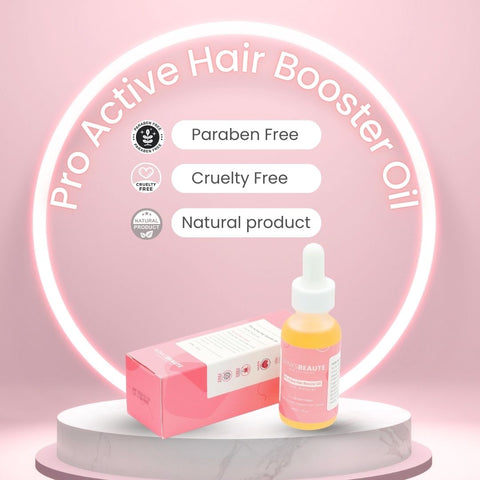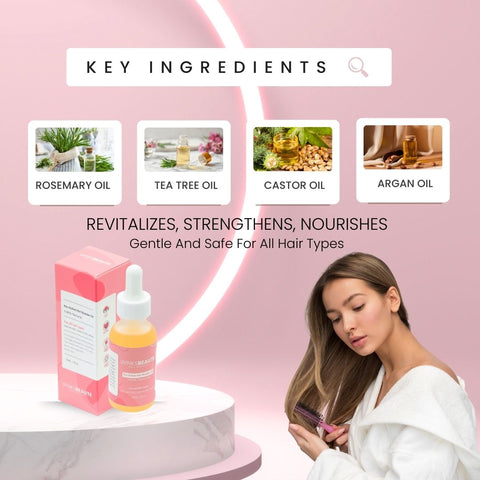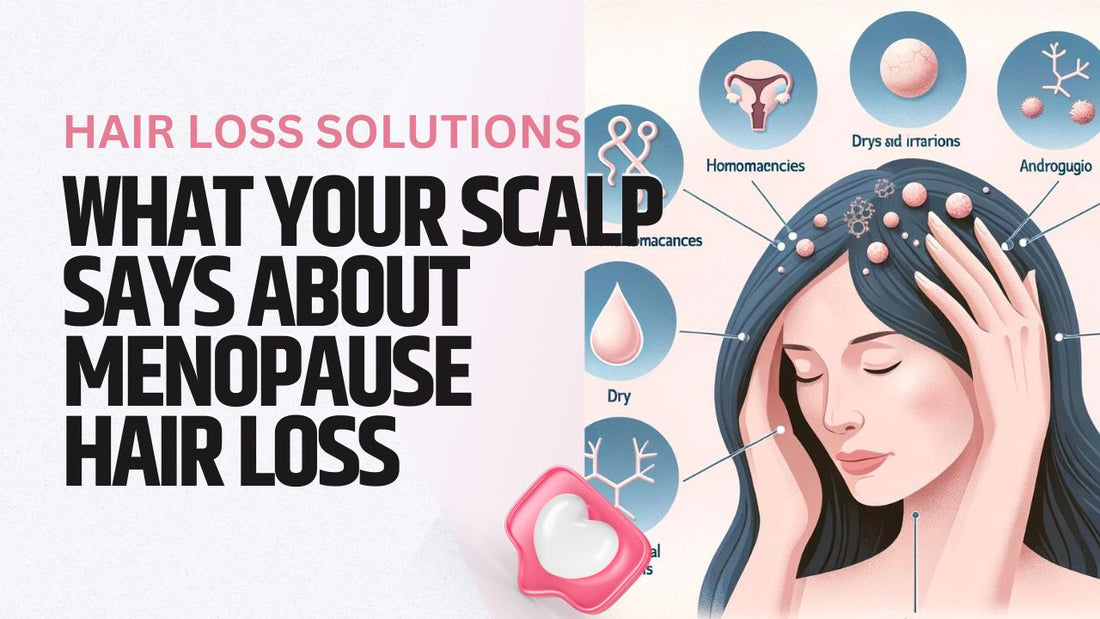
What Your Scalp Says About Menopause Hair Loss
Share
While menopause is often associated with hot flashes, mood swings, and weight fluctuations, one of the lesser-discussed yet equally concerning issues is hair loss. As women navigate this transitional phase, the changes in hormone levels can significantly impact the health and vitality of their hair. However, the key to understanding and addressing menopausal hair loss lies not just in the strands themselves but in the condition of the scalp. Your scalp serves as the foundation for healthy hair growth, and its state can provide valuable insights into the root causes of your thinning tresses. In this comprehensive guide, we'll delve into the intricate relationship between scalp health and menopause hair loss, empowering you with the knowledge and strategies to revitalize your locks from the roots up.
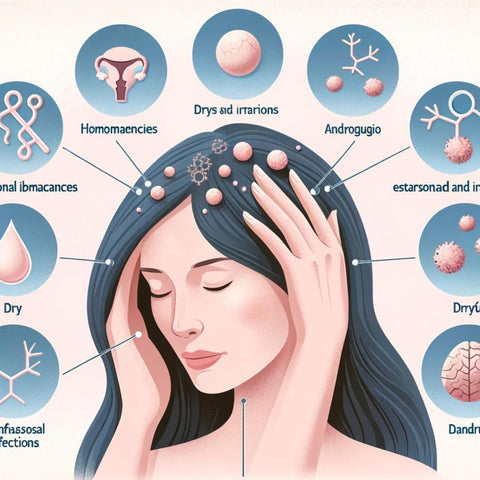
The Scalp's Role in Hair Growth
Hair Follicle Biology
To truly appreciate the scalp's significance, it's crucial to understand the biology of hair follicles. The hair follicle is a complex structure embedded in the scalp, responsible for the growth and regeneration of each individual hair strand.
At the base of the follicle lies the hair bulb, which is surrounded by the dermal papilla – a cluster of cells that regulate the hair growth cycle. The dermal papilla is nourished by a network of blood vessels, delivering essential nutrients and oxygen to the hair follicle.
Importance of a Healthy Scalp
A healthy scalp plays a vital role in maintaining the optimal environment for hair growth. The sebaceous glands in the scalp produce sebum, which helps lubricate and protect the hair and skin. Additionally, a well-balanced scalp pH is essential for preventing dryness, irritation, and the overgrowth of harmful microorganisms.
Adequate blood circulation in the scalp is also crucial, as it ensures that the hair follicles receive the necessary nutrients and oxygen required for robust hair growth. When the scalp is compromised, either due to hormonal imbalances, stress, or other factors, it can disrupt the delicate hair growth cycle and lead to excessive shedding and thinning.
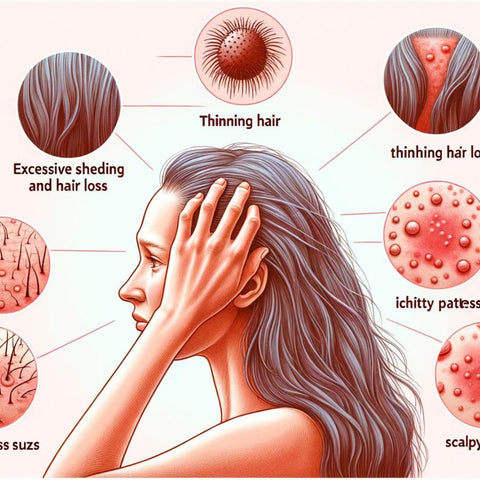
Common Scalp Issues During Menopause
Hormonal Imbalances
During menopause, the fluctuations in estrogen and androgen levels can wreak havoc on scalp health. Estrogen plays a crucial role in regulating sebum production and maintaining a balanced scalp environment. As estrogen levels decline, the scalp can become drier and more prone to irritation.
Conversely, an increase in androgen levels during menopause can lead to an overproduction of sebum, potentially causing oily scalp conditions and an imbalance in scalp pH. This imbalance can create an ideal environment for the overgrowth of harmful microorganisms, leading to issues like dandruff and fungal infections.
Dryness and Irritation
One of the most common scalp issues women face during menopause is dryness and irritation. The hormonal changes can disrupt the scalp's natural moisture balance, leading to flaking, itching, and general discomfort.
Dehydration can also contribute to scalp dryness, which may be exacerbated by factors such as medication side effects, stress, and environmental conditions. When the scalp becomes overly dry, it can create an inhospitable environment for healthy hair growth, potentially leading to excessive shedding and thinning.
Dandruff and Fungal Infections
As if the dryness and irritation weren't enough, women experiencing menopause hair loss may also face an increased incidence of dandruff and fungal infections on the scalp. These conditions can manifest as white or yellowish flakes, itching, and even redness or scaling.
The hormonal changes during menopause that contribute to hair loss can also disrupt the scalp's delicate microbiome, allowing opportunistic fungi like Malassezia to thrive. This overgrowth of fungi can lead to conditions like seborrheic dermatitis, which is characterized by dandruff, itching, and inflammation.
Furthermore, stress and weakened immune function during menopause hair loss can make women more susceptible to fungal infections on the scalp, such as tinea capitis (ringworm). These infections can cause further hair loss, scaling, and discomfort, exacerbating the challenges of menopausal hair thinning.
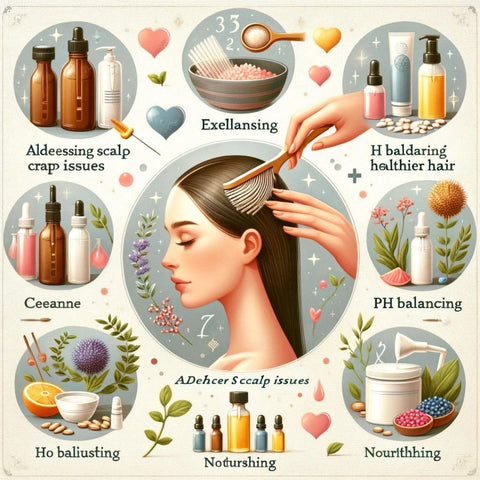
Signs of Scalp Stress and Hair Loss
While scalp issues can be distressing on their own, they can also serve as warning signs of impending hair loss. It's essential to be aware of these signs and address them promptly to prevent further damage and thinning.
Excessive Shedding
One of the most obvious signs of scalp stress is excessive shedding. If you notice an abnormal amount of hair falling out during brushing, showering, or even while running your fingers through your hair, it could be a red flag. While some degree of shedding is normal, excessive daily hair loss can be a symptom of an underlying scalp condition.
Thinning Hair
As scalp issues persist, you may notice your hair appearing thinner and less voluminous. This thinning can be particularly noticeable on the top of the head or along the part line, where the scalp is more visible.
Itchiness and Redness
Scalp irritation can manifest as persistent itchiness, redness, or even a burning sensation. These symptoms can be caused by dryness, inflammation, or underlying conditions like seborrheic dermatitis or psoriasis.
Bumps or Scaly Patches
In some cases, scalp issues can lead to the formation of bumps or scaly patches on the skin. These can be signs of fungal infections, clogged hair follicles, or other scalp disorders that require medical attention.
Addressing Scalp Issues for Healthier Hair
Maintaining a healthy scalp is crucial for promoting hair growth and preventing excessive shedding during menopause. By addressing scalp issues promptly and adopting the right strategies, you can create an optimal environment for your hair to thrive.
Gentle Cleansing and Exfoliation
Regular cleansing and exfoliation can help remove buildup, excess oil, and dead skin cells from the scalp. However, it's important to use gentle, sulfate-free shampoos and avoid harsh scrubbing, which can further irritate the scalp.
Consider incorporating a scalp scrub or exfoliating treatment into your routine once or twice a week. Look for products containing natural ingredients like salt, and sugar, or gentle chemical exfoliants like lactic acid or glycolic acid. These can help slough off dead skin cells and promote a healthier scalp environment.
Balancing Scalp pH
Maintaining a balanced scalp pH is essential for preventing dryness, irritation, and the overgrowth of harmful microorganisms. The ideal scalp pH should be slightly acidic, ranging from 4.5 to 5.5.
Consider using scalp-balancing products or exploring natural remedies like apple cider vinegar rinses or diluted lemon juice applications. These can help restore the scalp's natural pH levels and create an inhospitable environment for fungi and bacteria.
Nourishing and Hydrating
In addition to cleansing and balancing the scalp, it's crucial to nourish and hydrate it to promote healthy hair growth. Look for products containing natural oils and serums that can penetrate the scalp and deliver essential nutrients.
Introducing Proactive Rosemary Hair Booster Oil
One exceptional product that addresses both scalp health and hair growth is Proactive Rosemary Hair Booster Oil. This innovative formula combines the power of rosemary oil with other nourishing ingredients to create a potent solution for menopausal hair concerns.
Key Ingredients and Their Benefits
- Rosemary Oil: Rich in antioxidants and anti-inflammatory properties, rosemary oil has been proven to promote hair growth, increase hair thickness, and improve scalp health.
- Grape Seed Oil: Packed with vitamin E and essential fatty acids, grape seed oil nourishes the scalp and strengthens hair strands, preventing breakage and promoting volume.
- Castor Oil: Known for its ability to improve blood circulation, castor oil can deliver essential nutrients to the hair follicles, promoting healthy growth and volume.
- Tea Tree Oil: Renowned for its antimicrobial and antiseptic properties, tea tree oil helps maintain a healthy scalp environment, which is essential for voluminous hair growth.
How to Use Proactive Rosemary Hair Booster Oil
Incorporating Proactive Rosemary Hair Booster Oil into your hair care routine is simple and effective. Gently massage the oil onto your scalp, focusing on the areas of thinning or excessive shedding. This method not only nourishes the scalp but also stimulates blood circulation, delivering essential nutrients to the hair follicles.
For added benefits, you can also apply the oil to the lengths of your hair, paying special attention to the ends, which are often prone to dryness and breakage.
Combining with Other Scalp Treatments
Proactive Rosemary Hair Booster Oil can be used in conjunction with other scalp treatments, such as medicated shampoos or topical solutions prescribed by your dermatologist. Its natural and gentle formula makes it a versatile addition to your scalp care routine.
Lifestyle Factors Affecting Scalp Health
While targeted products and treatments are essential, it's also crucial to address lifestyle factors that can impact scalp health and contribute to menopausal hair loss.

Diet and Nutrition
A balanced diet rich in essential nutrients is critical for maintaining a healthy scalp and promoting hair growth. Ensure that your diet includes adequate amounts of protein, iron, zinc, biotin, and vitamins like vitamins C and D. These nutrients play vital roles in supporting the hair growth cycle and maintaining scalp health.
Stress Management
Stress can have a profound impact on scalp health and hair loss during menopause. High levels of stress hormones, like cortisol, can disrupt the hair growth cycle and lead to excessive shedding. Additionally, stress can contribute to scalp inflammation and exacerbate existing scalp conditions.
Incorporate stress-relieving activities into your routine, such as exercise, meditation, yoga, or engaging in hobbies you enjoy. These practices can help manage stress levels and promote a healthier scalp environment.
Environmental Factors
External factors like sun exposure, pollution, and harsh weather conditions can also affect scalp health. Protect your scalp from excessive UV radiation by wearing hats or using protective hair products. Additionally, consider using gentle cleansing and nourishing products to counteract the effects of environmental pollutants.

Seeking Professional Help for Persistent Issues
While many scalp issues can be addressed through lifestyle changes and targeted hair care products, persistent or severe cases may require professional medical attention.
When to Consult a Dermatologist
If you experience excessive hair loss, persistent scalp irritation, or any unusual symptoms, it's advisable to consult a dermatologist. They can help identify the underlying cause of your scalp issues and provide appropriate medical treatments.
Potential Medical Treatments
Depending on the diagnosis, your dermatologist may recommend various treatments, such as:
- Medicated shampoos or topical solutions to address specific scalp conditions like dandruff or fungal infections.
- Oral medications or hormone replacement therapy to address hormonal imbalances contributing to hair loss.
- Steroid injections or topical creams to reduce scalp inflammation and promote hair growth.
- Laser or light therapies to stimulate hair follicles and encourage new growth.
It's important to follow your dermatologist's instructions and be patient, as some treatments may take several months to show noticeable results.
Embracing Your Hair's Journey with Self-Care
While addressing scalp issues and combating menopausal hair loss is essential, it's equally important to embrace your hair's journey with self-care, self-acceptance, and confidence.
Self-Acceptance and Confidence
Menopause is a natural transition, and the changes in your hair and scalp are part of this process. Embrace your journey with self-acceptance and confidence. Remember that your self-worth is not defined by your hair but by the strength and resilience you demonstrate in navigating this phase of life.
Prioritizing Scalp Health
Maintaining a healthy scalp should be a priority, as it lays the foundation for strong, vibrant hair. Incorporate scalp care practices into your routine, and be consistent in addressing any issues that arise.
Consistency and Patience
Addressing menopausal hair loss and scalp issues requires patience and consistency. While some solutions may provide immediate relief, others may take time to show visible results. Stay committed to your hair care regimen and trust the process, celebrating small victories along the way.
Conclusion: Nurturing Your Roots for Resilient Hair
Your scalp is the foundation of your hair's health, and its condition can provide valuable insights into the root causes of menopausal hair loss. By understanding the intricate relationship between scalp health and hormonal changes, you can take proactive steps to address scalp issues and promote a healthy hair growth environment.
Embrace a holistic approach that combines targeted hair care products like Proactive Rosemary Hair Booster Oil, lifestyle changes, and professional medical advice when necessary. Remember, nurturing your roots is the key to achieving resilient, vibrant hair throughout your menopausal journey and beyond.
FAQ Section
Can stress really cause scalp issues and hair loss during menopause?
Yes, stress can have a significant impact on scalp health and hair loss. High levels of stress hormones can disrupt the hair growth cycle and lead to excessive shedding. Additionally, stress can contribute to scalp inflammation and exacerbate existing scalp conditions.
How often should I exfoliate my scalp?
It's generally recommended to exfoliate your scalp once or twice a week, depending on your individual needs. Excessive exfoliation can lead to irritation, so it's important to strike a balance.
Is it safe to use Proactive Rosemary Hair Booster Oil if I have a sensitive scalp?
Proactive Rosemary Hair Booster Oil is formulated with natural, gentle ingredients and is generally well-tolerated by most individuals. However, it's always a good idea to perform a patch test before using any new product, especially if you have a history of sensitive skin or allergies.
How long does it take to see results from using Proactive Rosemary Hair Booster Oil?
Results may vary from person to person, but many users report seeing improvements in hair growth, thickness, and overall hair health within a few weeks to months of consistent use.
Can scalp issues during menopause be a sign of an underlying medical condition?
In some cases, persistent or severe scalp issues can be indicative of an underlying medical condition, such as hormonal imbalances, autoimmune disorders, or nutrient deficiencies. If you experience persistent scalp issues or excessive hair loss, it's advisable to consult a dermatologist for proper diagnosis and treatment.

